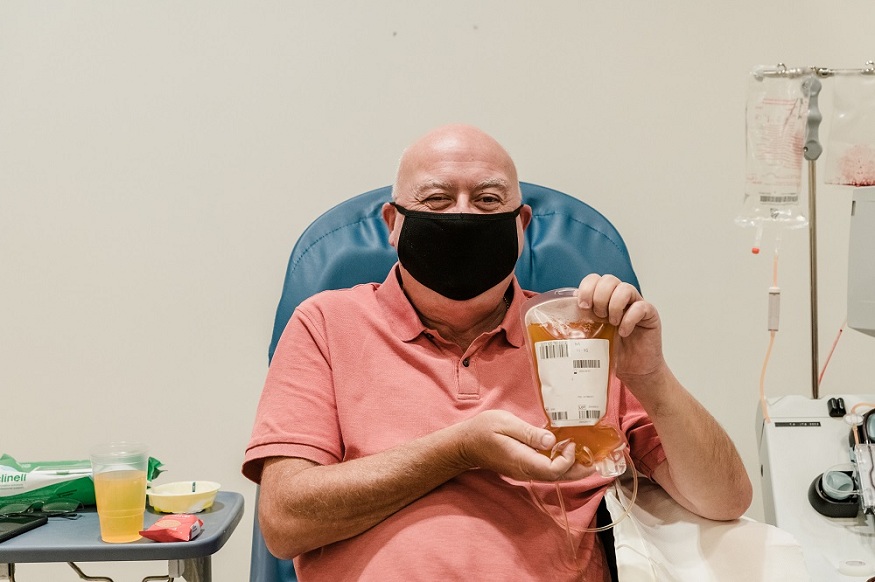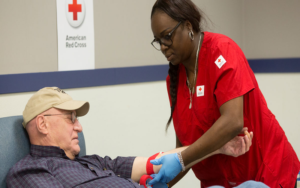Plasma Donation: How It Works And Why It’s Important

When you consider the intricate process of plasma donation and its significant impact on medical treatments, you start to grasp the essential role it plays in healthcare. From the meticulous screening of donors to the specialized apheresis procedure, each step contributes to saving lives and advancing research in ways you might not have imagined. Understanding the complexities behind plasma donation can offer a new perspective on the critical importance of this practice in the medical field.
Plasma Donation Process
Donating plasma is a straightforward and rewarding process. It all begins with donor screening, where you’ll be asked some questions about your medical history and undergo a brief physical examination to ensure you’re eligible to donate. Once you pass this stage, you’re ready to proceed with the donation process.
When you arrive at the donation center, you’ll be welcomed by the staff who’ll guide you through the process. You’ll be asked to provide some personal information and identification for verification purposes. After that, a healthcare professional will draw your blood, separate the plasma, and return the red blood cells and other components back to your body. This process typically takes around 60-90 minutes.
During the donation, you can relax, read, or watch TV. It’s crucial to stay hydrated before and after the donation to help your body replenish the lost plasma quickly. Once the process is complete, you’ll receive a small compensation for your time and contribution. Your donated plasma will be used to create life-saving medications for various medical conditions, making a significant impact on the lives of others.
Donor Eligibility Criteria
To ensure the safety and effectiveness of plasma donations, specific criteria must be met by potential donors. Meeting these criteria not only ensures the health benefits of both the donor and the recipients but also maintains the quality of the plasma collected for medical treatments. Donor requirements are in place to safeguard the well-being of all parties involved in the donation process.
Donor eligibility criteria typically include age restrictions, with donors needing to be at least 18 years old. This age requirement is essential for ensuring that donors are mature enough to understand the donation process and provide informed consent. Additionally, donors must meet certain weight requirements to ensure that the donation process doesn’t pose any risks to their health.
Furthermore, donors are required to undergo a screening process to assess their overall health. This screening may include questions about medical history, current medications, and lifestyle factors.
Donors must also pass physical examinations to ensure that they’re in good health and free from any conditions that could be transmitted through plasma donation.
Collection and Separation
During plasma donation in Glassboro, the process involves the collection and separation of plasma from the donor’s blood. Plasma separation is typically done using a machine called a plasmapheresis instrument, which separates the plasma from other blood components. These procedures are carried out in specialized donation centers equipped with the necessary technology and trained staff to ensure the safety and comfort of donors.
Collection techniques for plasma donation vary, but the most common method is through a process called apheresis. In this procedure, blood is drawn from the donor’s arm into the plasmapheresis instrument. This machine then separates the plasma from the blood cells and returns the remaining components back to the donor’s bloodstream.
The separated plasma is collected in a sterile bag and can be used to create various plasma products that are vital for medical treatments.
Plasma products derived from donations play a crucial role in treating a wide range of medical conditions, including immune deficiencies, clotting disorders, and autoimmune diseases. By donating plasma, you’re contributing to the production of life-saving medications that can improve the quality of life for many individuals worldwide.
Through the collection and separation of plasma, donation centers are able to supply healthcare facilities with essential plasma products that are integral to modern medicine.
Plasma Uses and Benefits
Plasma, a vital component of blood, serves a crucial role in modern medicine due to its versatility and life-saving properties. Thanks to medical advancements, plasma has become a key resource in developing lifesaving treatments for a wide range of conditions.
One of the significant benefits of plasma is its ability to help patients with clotting disorders. Through plasma-derived clotting factors, individuals with hemophilia or other clotting deficiencies can receive the necessary proteins to effectively manage and prevent bleeding episodes. This treatment has revolutionized the lives of many patients, allowing them to lead more active and healthy lifestyles.
Plasma is also essential in producing immunoglobulins, which are antibodies that help the immune system fight infections. Individuals with immune deficiencies rely on plasma-derived immunoglobulins to boost their immunity and prevent severe infections.
Moreover, plasma is used in treating burn victims, providing essential proteins that aid in the healing process and reduce the risk of complications.
Impact on Medical Treatments
With its indispensable contributions to clotting disorders and immune deficiencies, plasma plays a pivotal role in enhancing various medical treatments. Medical advancements have been greatly influenced by the availability of plasma donations. Plasma-derived products like immunoglobulins have revolutionized the treatment of autoimmune diseases and primary immunodeficiency disorders. These treatment innovations have significantly improved the quality of life for patients suffering from these conditions.
Plasma donations have also been instrumental in the development of therapies for clotting disorders such as hemophilia. Clotting factors derived from plasma donations have enabled hemophilia patients to effectively manage their condition and prevent life-threatening bleeding episodes. This treatment innovation has transformed the outlook for individuals living with hemophilia, allowing them to lead more active and fulfilling lives.
Moreover, plasma plays a crucial role in supporting patients undergoing organ transplants or major surgeries by providing essential blood products like albumin and coagulation factors. These plasma-derived products help in maintaining blood volume, supporting coagulation, and ensuring successful surgical outcomes.
Community Health Advantages
Community health benefits from plasma donations extend beyond individual patient treatments, impacting the broader population through various initiatives and programs. By contributing to public health efforts, plasma donations play a crucial role in disease prevention within communities. When you donate plasma, you aren’t only helping individual patients but also supporting public health initiatives aimed at safeguarding the overall well-being of society.
Plasma donations are essential for developing life-saving medications and treatments that can combat various diseases and health conditions. By contributing to plasma donation programs, you’re actively participating in disease prevention efforts that benefit the entire community. Your donation can be used to create medications for conditions such as immune deficiencies, hemophilia, and other serious illnesses, ultimately improving public health outcomes.
Moreover, plasma donations support research and development projects focused on advancing medical knowledge and enhancing healthcare practices. By donating plasma, you’re assisting in the creation of innovative treatments that can address emerging health threats and improve disease management strategies. Your contribution directly contributes to the advancement of public health initiatives, making a significant impact on the well-being of communities.
Research and Scientific Contributions
Engaging in plasma donation not only aids in patient treatments but also contributes significantly to research and scientific advancements. Donor studies play a crucial role in understanding the effects of plasma donation on individuals. By participating in donor studies, you provide researchers with valuable information that helps enhance the safety and effectiveness of plasma-derived treatments.
These studies help identify potential risks and develop strategies to minimize them, ensuring the well-being of both donors and recipients.
Moreover, your plasma donation directly contributes to scientific advancements in the field of medicine. Researchers rely on plasma donations to develop innovative therapies for various medical conditions. Your donation enables scientists to conduct experiments, study new treatments, and improve existing ones.
Without the generosity of donors like you, many breakthroughs in medical science wouldn’t be possible.
Importance in Emergency Situations
Playing a vital role beyond research and scientific advancements, plasma donation holds immense importance in emergency situations. When emergencies strike, such as natural disasters or mass casualty incidents, the need for plasma becomes critical. Your plasma donation has a life-saving impact during these dire times.
In emergency situations, there’s often a critical need for plasma to treat trauma patients, burn victims, and individuals with severe bleeding disorders.
Your donated plasma, rich in proteins and antibodies, can be used to help stabilize patients and support their recovery. Without an adequate supply of plasma, medical professionals may struggle to provide the necessary care to those in urgent need.
Global Health Implications
With its far-reaching impact on healthcare systems worldwide, plasma donation plays a crucial role in addressing global health challenges. Public health initiatives heavily rely on the availability of plasma to produce vital medications for various diseases. Plasma-derived products are essential for disease prevention and treatment, particularly for individuals with compromised immune systems or rare conditions.
Plasma donations contribute significantly to the overall well-being of populations by providing access to life-saving treatments that would otherwise be unavailable. The global demand for plasma continues to rise as healthcare systems strive to combat infectious diseases, immune disorders, and other medical conditions. By donating plasma, you directly support public health efforts by ensuring a stable supply of essential medications for those in need.
Moreover, plasma donation plays a pivotal role in preventing the spread of diseases by enabling the production of vaccines and immunoglobulins. These products are crucial for building immunity against infectious agents and reducing the prevalence of communicable illnesses. Your contribution as a plasma donor directly impacts disease prevention on a global scale, safeguarding communities from potential health crises.
In essence, your decision to donate plasma has a profound impact on public health initiatives and disease prevention efforts worldwide. Your generosity helps save lives and improve the overall health outcomes of individuals across the globe.
How to Get Involved
Interested in making a difference in global healthcare? Getting involved in plasma donation is a meaningful way to contribute to improving healthcare systems worldwide. There are two key ways you can participate: donor recruitment and volunteer engagement.
Donor recruitment plays a vital role in ensuring a steady supply of plasma for various medical treatments. If you’re eligible to donate plasma, consider reaching out to local donation centers or blood banks to inquire about becoming a donor. By donating plasma regularly, you can help save lives and support medical research and development.
Volunteer engagement is another important aspect of supporting plasma donation initiatives. You can get involved by spreading awareness about the importance of plasma donation in your community or online. Organize events, fundraisers, or information sessions to educate others about the impact of plasma donation on healthcare systems globally. By actively engaging with others and encouraging them to participate, you can help increase donation rates and save more lives.
Whether you choose to donate plasma or volunteer your time to promote plasma donation efforts, your involvement can make a significant difference in advancing global healthcare. Join the cause today and be a part of this life-saving mission.
Conclusion
So next time you consider donating plasma, remember: your contribution is vital in saving lives, supporting medical research, and improving global health outcomes. Your donation truly makes a difference in the lives of those in need. Keep up the great work and continue to make a positive impact through plasma donation. Thank you for your generosity and dedication to helping others.







